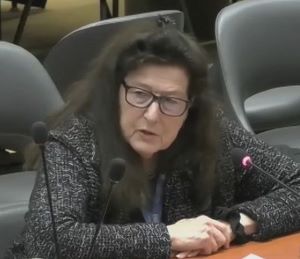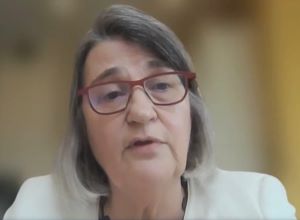Ms. Sylvia Beales Gelber and Ms. Odile Frank, both members of the Global Coalition for Social Protection Floors (GCSPF), participated at the 2024 UNECE Regional Forum on Sustainable Development.
Ms Sylvia Beales Gelber and Ms Odile Frank spoke in Round Table 1: SDG1 - No Poverty (Preparing social protection systems to respond to the poverty impacts of the climate crisis and green transitions) that was held on 13 March 2024. This session was part of the Opening and High-level Policy Segment. Further information on this session is available here and the recording is here.

Odile Frank highlighted there are two major ways in which social protection has an impact on what we are going to experience from climate change. The first is clearly the issue of shocks and crises and the immediate solutions required for populations that have been made vulnerable by these crises and this is a very important function of social protection. The other area is the usefulness of social protection to assist workers in undergoing just transition to green, and I insist that just transition to green is not only a green transition, but it should also be accountable in respect of ILO recommendations regarding decent work and respect for labour rights.
At a later point in the discussion, Odile Frank added that in regard to the issue of displaced populations, migrants and asylum seekers, the GCSPF had always as a principle supported de facto residency-based access. This approach requires that there should be cooperation and agreements across countries. It also requires support for civil vital registration systems globally, which enables individuals to have the identity giving them access to social protection where they find themselves.
Sylvia Beales Gelber highlighted the history and the rationale of the SPF recommendation 202, and that the right to social security for all is enshrined in the 1948 UDHR and a range of subsequent human rights provisions and treaties. However over half of the world still does not have access to the full range of social protection guarantees; including in the UNECE region. Updated and fully disaggregated data is essential to ensure all people across their life course have social protection, as is adequate and long term finance. As the world ages in all regions social protection is a vital and essential policy measure to lessen intergenerational transfer of poverty.

Sylvia explained the life course elements of the social protection floor, as it provides for basic income in childhood, old age, for persons with disability and the unemployed together with access to health. Design for social protection must be multidimensional and integrated as communities are composed of people of different ages, sex, ethnicities and locations; all with different charteristics. Civil society organisation are well equipped to identify gaps in social protection as they know what is going on at local level. Barriers to access to entitlements can often be due to lack of legal documentation, itself a denial to rights. Members of the GCSPF are working on issues of legal documentation for children and adults. Social protection accountability to maximise the reach of social protection is another important area of work for members of the Coalition. Population movement due to conflict and climate change means that there are gaps and errors in documention held by local officials and in national data systems. This can be corrected with civil society monitoring leading to more inclusive mechanisms being put in place.
Multiple studies and country experiences show it is perfectly possible both to have accurate data for social protection and to set a national budget within each country. Financing social protection and system building for it over the long term is a matter of global and national political will. The Global Coalition, comprising over 120 civil society organisations, thinktanks and NGOs is calling for a solidarity based Global Fund for Social Protection to ensure the necessary finance and technical know how is available for all countries in all regions to put in place the right of all to universal provision.
Sylvia also talked about how social protection has positive outcomes for people of all ages and countries is not in doubt. Social protection is both a human rights and a fundamental lever for the achievement of all SDGS and its financing is of utmost priority in the final six years of SDG implementation. There is no time to waste.
Social protection will play an important role in enabling the green transition and adapting to and mitigating climate change, by assisting workers in their re-skilling and re-employment in a just transition to a green economy and decent work for all.
This round table allowed participants to learn from each other and share information on the best ways to address the growing poverty impacts of the climate crisis in the region as well as explore potential gains from green and digital transitions.
The UN Economic Commission for Europe (UNECE) convened its annual regional forum on sustainable development (RFSD) in preparation for the High-level Political Forum on Sustainable Development (HLPF) in July 2024. The forum explored opportunities for advancing key transitions and cooperation towards achieving the SDGs in the region and discussed progress towards the Goals undergoing in-depth review in 2024.
The 2024 UNECE Regional Forum on Sustainable Development took place in Geneva, Switzerland, from 13 to 14 March. The UNECE region comprises the countries of Europe as well as countries in North America (Canada and the US), Central Asia (Kazakhstan, Kyrgyzstan, Tajikistan, Turkmenistan, and Uzbekistan), and Western Asia (Israel).